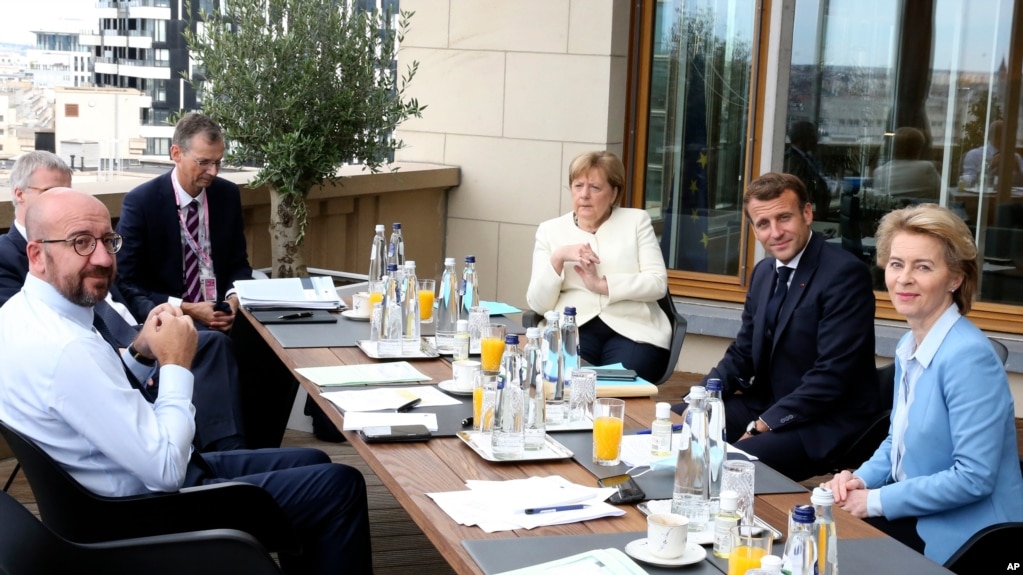
After four days and nights of negotiations, European Union (EU) leaders have agreed on a 1.8 trillion-euro budget and coronavirus aid package.
The 27 leaders agreed on Tuesday to a massive aid program to help areas hit hardest by COVID-19. The disease has already killed 135,000 people within EU member countries.
“Extraordinary events, and this is the pandemic that has reached us all, also require extraordinary new methods,” German Chancellor Angela Merkel said.
The EU faces the biggest recession in the group’s history. To fight back, EU members will establish a 750 billion-euro coronavirus fund. The aid will be sent as loans and grants to the hardest-hit countries. That is in addition to the agreement on the seven-year, 1 trillion-euro EU budget that leaders had been arguing over for months.
“The consequences will be historic,” noted French President Emmanuel Macron. “We have created a possibility of taking up loans together.”
Sharing debt would have been unthinkable just a few months ago because some EU member countries refused to help to those with economic problems. Merkel and Macron argue the economic nationalism had to end.
“We have laid the financial foundations for the EU for the next seven years and came up with a response to this arguably biggest crisis of the European Union,” Merkel said.
She and Macron worked together to get the arguing countries to find an answer. Over the weekend, the two walked out of a meeting to protest the lack of agreement. Then, they waited.
“When Germany and France stand together, they can’t do everything. But if they don’t stand together, nothing is possible,” Macron said.
“There are 27 of us…and we managed to come up with a joint budget. What other political area in the world is capable of that? None other,” he added.
Merkel and Macron wanted the grants to total 500 billion euros. However, five wealthy northern nations, led by the Netherlands, demanded spending cuts and economic reforms in return from the hardest hit southern nations, like Greece. The amount was lowered to 390 billion euros, while the five northern nations received promises of reforms.
“There is no such thing as perfection, but we have managed to make progress,” Macron said.
The meeting shows how often nations’ self-interests seemed more important than the common good for all. The arguing was unpleasant.
“There were extremely tense moments,” Macron said.
Since every EU leader had the right of veto on the whole package, the joint agreement to spend so much money was praised as an extraordinary success.
Adriaan Schout is an expert on the EU and Senior Research Fellow at the Clingendael research group in the Netherlands. He said that the unusually long negotiations produced a deal that is good for the European Union.
“The EU hasn’t changed. This is always what it’s about — finding compromises — and the EU always finds compromises,” he said. “And the compromise has been hard fought. There are checks and balances in it. We don’t know how they will work,” he added.
“We all can take a hit,” said Dutch Prime Minister Mark Rutte. “After all, there are presidents among us.”
Following difficult negotiations with Merkel, Macron, and Italian Prime Minister Giuseppe Conte, Rutte said that “we have very good, warm relations.”
Conte also did not want to waste time on arguing. More than 35,000 Italians have died from COVID-19. The EU estimates Italy’s economy will shrink 11.2 percent this year.
To open schools in September, his country needs up to 3 million new desks so students can keep a safe distance from other students.
’’We will have a great responsibility. With 209 billion euros, we have the possibility to relaunch Italy with strength, to change the face of the country. Now we must hurry.” Conte said.
The European Parliament must still approve the deal.
Words in This Story
extraordinary - adj. something very unusual
pandemic - n. a contagious disease that crosses country borders
fund - n. an amount of money set aside for a special purpose
grant - n. an amount of money that is given away to assist someone or something
consequence - n. the results of an action
foundation - n. that base upon which something is built
manage - v. to direct or control
moment - n. a single instance
fellow - n. someone who is named as a scholar at an institution
desk - n. the item students sit on